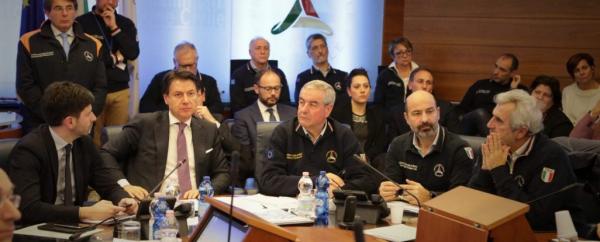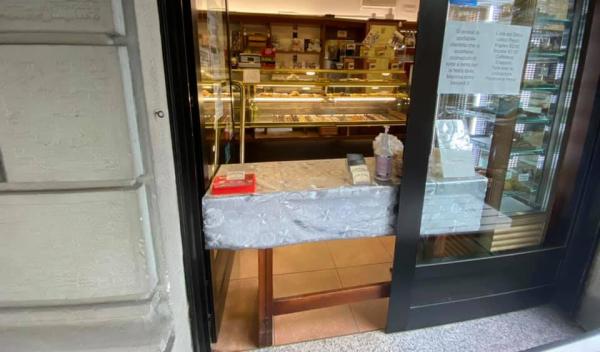#Italylockdown is over. Lack of meaning continues
I have a depressing feeling about this…

#Italylockdown finished on May 3rd (yay?), so now Italy is way ahead than almost every other country as a showcase of what really comes after.
Daily life in the last two weeks of #italylockdown
(a few more facts from the same moment are in this other post, that I recommend you to read and then come back here)
This morning I heard kids playing again in the street, and it felt great.
People with cash to spare have a great time, because plenty of stuff is on sale, or comes with discounts on future purchases. The others, not so much.
Real estate agents can restart bringing customers to visit homes for sale, but only for second visits, or if no mortgage (that is no other outings) are needed, to minimize circulation.
Business as usual for daily crime and (luckily, rare) human misery. A nurse in Lucca found in her mailbox a complaint from other residents that “You bring COVID19 to us!!!". Drug dealers play food delivery riders, hiding cocain in rice, and money in sandwiches.
Low politics is doing fine. League leader Matteo Salvini claimed as a success of his party a measure to delay reopening of betting halls, proposed for sanitary reasons mainly by the same NGOs that he accuses to bring in too many refugees. Parties in government quarrel over whether all illegal migrants should be given temporary visas to save this year’s harvest, but even those against migrants fail to propose ways for furloughed Italians to do the same jobs legally (I already reported on this here).
Managements of Masses is messy. Right now, public Masses, and religious ceremonies in general, are a rebus all over Europe, and even more so in Italy. Questions like “If 16 people can stay in a 16 sq. meters bus, “why can’t the same people attend Mass or funerals in a 150 sq. meters church???" appear simultaneously to a letter in the Jesuits magazine, asking whether the protests against church closures are inspired by capital “F” Faith or, instead, a “religiousness that should need purification”.
COVID19 management is a male-first business:

An analysis of the several “COVID19 task forces at national and regional level” revealed that they are on average 80% male, even more at higher levels. PM Conte then asked to patch the situation, by adding women to existing workgroups. On a related note, the complete composition of the top scientific committee of the Civil Protection Agency was unknown for more than 2 months.
Maskbergs may replace fatbergs in Italy, and then worldwide. Or maybe the right name would be “covidbergs”, because this image I found on Twitter:

is just the mask component of all the single-use, hardly recyclable accessories of all sorts, that the pandemic is bringing to already full, often illegal landfills all over the country. If people can buy those masks, that is.
Affordable masks for everybody. Some day. The italian government declared masks mandatory in public places after May 3rd, and accordingly fixed by decree the maximum retail price of single-use surgical masks at 50 cents plus VAT, starting May 4th. That is great, except for the detail that (as of May 7th) no Italian manufacturer or importer can deliver such masks at that price without funding, or with proper certification.
Leisure/entertainment businesses prepare to die, or at least refuse to restart. Many italian retail stores may survive post-COVID19 regulations by keeping customers in the street, like this pastry shop:

But, for example, hotels in Lombardy that could reopen after May 4th will stay closed, because without clients, they would lose even more money than before. Restaurants, bars and pubs without outdoor spaces “will just die, period”, for reduction of patrons up to 80%, or lack of clarity on how to seat parties of more than four people. Wine bars don’t know how to handle customers at all.
Other businesses try to adapt. Some cousins of mine who own a typography business are sending out a brand new catalog of “COVID19 street signs, information booklets, warning labels…”. Of course, they have no idea how many of their previous customers will survive long enough to need them.
My wife’s hairdresser called last week, to desperately inform her that sh accepts appointments again… at home, because she’s still forbidden to reopen her salon, that couldn’t possibly be less safe than an uncontrollable home open to strangers. Thanks, but no thanks.
Too many people don’t get the “two weeks asymptomatic incubation” thing. In Porto S. Elpidio (Marche), for example, crowds strolled on the seafront as soon as May 4th. The beaches of Rome remain closed until May 17th, for lack of personnel, to avoid the same thing.
Dependency on Big Tech increases
While italian policymakers continue to mess with contact tracing (see below), Big Tech continues to ignore them, legislating with its own means, at its own pace:

Latest iOS is contact tracing-ready, parliaments be damned
</em></u>
Almost half the worldwide population has used Facebook services in the last monthm, and Google Meet will be free of charge without time limits until September, that is when (just a coincidence, of course) reopening of schools will make the need for videoconferencing with already familiar data harvesting products stronger. In Italy and abroad, tech companies are also trying to colonize welfare systems.
Four italian school facts, one abstonishing absence
In case you missed my previous #italylockdown reports:
- Italian schools will remain closed for at least four more months, no matter what
- Italian school buildings have been falling apart for years, with 70 significant structural damages in 2019 and only one in eight building earthquake-resistant. Last year, the firefigthers of a school in my neighborhood informally warned the principal that next time he calls them for a routine inspection, they will be forced to just shut down the whole place
- The italian government is going to spend lots of billions of Euros to blindly “restart the economy”
- Specifically, the construction sector MUST restart as soon as possible, even if, as I reported one month ago, Italy already suffocates in cement
In a sane country, four facts like these would have already automatically morphed into one unstoppable, above-parties law of just two articles:
- Construction or completion of any new building except schools is forbidden until further notice, because we must…
- Use the greatest school closure and recovery plan since WWII to just bulldoze and rebuild, COVID19-compliant and at chinese speeds, as many schools as possible
But not here. Yes, of course there should be exceptions, for e.g. hospitals. But the fact that, as far as I can tell, no italian politician even tried to propose such a measure is appalling.
An embarrassing transition
On April 26th, one week before the end of nationwide lockdown, PM Conte appeared on TV to explain how Phase 2 would work. One really interesting part of that speech is no mention at all of Immuni, the mystical, but above all optional italian official app for contact tracing. The reason, speculates this article, would be a “secret battle inside the government” between who wants or needs to trust people to do the right thing by themselves, and who doesn’t, and consequently wants to delay reopenings. Because everybody agrees that, without a reliable way to track and isolate whoever is infected, there will be new emergencies.
The omission of Immuni was obscured from what may be (or so one hopes, at least) the worst, or at least the most pharcical government announcement so far: the explanation that from May 4th private encounters and gatherings would be finally allowed among “relatives” (“congiunti”) and people bonded by “stable affections” (“affetti stabili”). In human history, there must have been very few rules less definable AND less enforceable than this.
Who is “relatives” here? Only (legally married) parents and sons? Cousins? Up to which grade? “Stable affections” is even worst:

That is my fiancee. For real!
</em></u>
- “They did not say stable affection must be reciprocal, and I have been stably in love with Roberto Bolle for years. So I can visit him, right?” This is a real question I heard from a 22 year old student, and for all I know, the answer may be yes.
- “Is that a hooker in your passenger seat, or your fiancee?” “Both, officer, so no fines for me” (actual joke of the week here)
- Thanks to this announcement, now my 80 year uncles can’t wait to visit again all their sons, nephews and grandsons (that’s at least 50 of us, scattered all over Rome). And we don’t know how to tell them no, that would be really dangerous for you, please stay locked at home a few more weeks
The real madness here is to issue a decree whose sanctions depend on controls that are impossible to make quickly enough in the streets (when they are possible at least in theory, that is): “OK, now everybody in the street freeze, until we have called the census office to verify who is related to whom”. Something like “you can leave home now but, by default, all meetings of more than four non-cohabitant individuals remain forbidden” would have been immensely more useful, applicable and enforceable.
To stay on the safe side, mobile phone operators still display the slogan “IoRestoACasa” (“I stay at home”) instead of their name inside smartphones:

The current policy of my own family, regardless of decrees, remains that nobody leaves the house for at least two more weeks, unless it is absolutely necessary, or it is actually possible to not meet anybody else (e.g. a stroll in the public park nearby, around dawn).
Contact tracing is messy, and it’s about the future of healthcare in Italy
Ferrari, Electrolux and other companies have started their own contact tracing of employees, assuming nobody will ever sue them for unaccountable, possibly illegal employee surveillance, or unsafe handling of personal data. The Immuni app, and part of its location data, may be managed by the same society (SOGEI) that manages fiscal IT infrastructure. Then, conspirationists explain, if a restaurant owner and all her patrons install Immuni, the tax office will be able to automatically calculate taxes by just counting those paying patrons. Including, thanks to the limitations of Bluetooth and GPS, the legions living in the same building, visiting the next shop, or just stopping to browse the menu from the sidewalk.
This could be tolerable if it did limit contagions, but warnings that Immuni will be a sure flop without immediate testing, and maybe even confuse epidemiologists keep coming. One simple reasons is that the limitations above may generate lots of false positives even when counting contagions, not taxes.
But here is the best part: as of May 8th, four days after the beginning of Phase 2, Immuni is not just optional: it has not been released yet. Yes, Italy ended lockdown saying an app will help to “get our lives back”, but without having it ready.
Then there are the real issues about contact tracing, italian (or, more appropriately:western) style.
The real reason why apps like Immuni will be optional would not be privacy, but the fact that italian public administrations cannot make it mandatory without automatically becoming legally liable for lack of immediate testing or treatment, right after someone communicates to healthcare authorities that they got a warning from their smartphone (assuming they do, when that means losing a date, or a job).
If Immuni is optional, instead, wheovever it warns is the only responsible of protecting public health with more personal quarantine, until they can be tested and treated. Every time he gets a warning, as unpredictable as that is. Imagine living one year like that.
Society-wise, there is a much deeper issue. One of the many likely reasons why Lombardy was hit much worst than any other part of Italy may be the fact that it has the most profit-oriented healthcare system of the country, that led it to underestimate the situation. Today’s fights between “contact tracing as public (that is not-for-profit), or individual health intervention”, that is, may be just a proxy war over whether healthcare in Italy should remain a public, not-for-profit issue, or not.
Phase 2 is a mess, because nobody knows what it is
“They say that things will return normal “when this is over” [but] what the heck constitutes “this being OVER?"
“Phase 2 just means that now there is an ICU bed for you. Happy crowding!"
Those are just two of many similar, all real quotes I may report about post-outbreak living. Lockdown was hard, but easy to explain, enforce and practice. Italy after May 4th, 2020 is living, detailed evidence of how much, and why, no-lockdown is much harder to bear and much harder to practice. In short, this is because of:
- Complexity. Life is much more complex than stasis
- Uncertainty. Nobody knows how the virus works with enough confidence to exclude a second, much worst wave next autumn, especially when considering that so far we’ve had over 30K deaths without Coronavirus giving Rome, Naples and Milan (that is, 6/7 millions of crowded people) anything like the attention it paid to Bergamo
- Contact tracing that cannot guarantee normal life before a vaccine or real cure
- Mobility: There. Cannot. Be. Enough. Urban. Mobility to make italian GDP even remember what it was like in 2019, without causing a second wave
- Too much has been already broken anyway, and in many senses from now on it doesn’t really matter if it was the fault of coronavirus, Darth Vader or Maleficent.
In detail:
Complexity (and waste): the kind of plans discussed in Rome, Bruxelles and other EU capitals make it very hard to avoid that too much money ends in tax havens, before even reaching Mafia: “After the US and Switzerland, the countries with the biggest investment in EU economy are Bermuda, Jersey and the Caymans". For more on useless complexity, read here, starting from “Everything wrong after COVID19…".
Uncertainty: A report released in April by the italian Technical/Scientific Committee on COVID19 laid out about 90 different post-lockdown scenarios. The three considering a full “reopening” would cause an explosion of contagions, with ICU loads way worst (absolute worst case is 430K patients) than Italy experienced in March, when Lombardy had to fly patients to ICU units in Sicily. Reopening schools alone would be equivalent to 48K people in ICU by the end of the year (even a UK/German study warned against unlimited re-opening of schools and kindergartens, because children may be as infectious as adults.). And other outbreaks may come even earlier than autumn, if air conditioning can indeed carry the virus.
Mobility: there are not enough hours in the day, and often not enough physical space, to move enough people to make life of 2019 return. It’s as simple as that. I have already explained this in detail twenty days ago, and now proofs start to come, every day faster. To name just one, I’ve heard retailers point out that “if city majors open roads and sidewalks to bicycle tracks and restaurant tables, there will be no space for trucks to bring supplies to shops, or collect garbage… and if they don’t take into account that people will avoid subways and buses out of fear, traffic will be way worse than before”.

Man, THAT was a match we deserved to win. Let's win it!
</em></u>
On the “too much already broken” side… Personally, I see discussions on how to “get the (past) economy back” as useful as discussing how Italy should play now, to win the World Cup Final… of 1970. That match is already ended. In addition to the many arguments already presented in my previous reports about radical difference between this recession and, say, the 2008 meltdown, this week we have estimates of a 9.5% decrease of italian GDP in 2020, wrapped in the usual absolute faith that:
- the economy of 2019 was the only possible economy, rather than, as I observed two months ago, exactly what scientists AND economists were begging us NOT to do
- COVID19 is not a proof of how stupid that economy ALWAYS is, but a black swan
- whole sectors of that economy should not be just killed, and rebooted, but rescued
- democracy in Italy is not in danger, after a crash like this
That’s one short-sighted and embarrassing way to celebrate the 75th anniversary of the end of WWII in Europe. If Martians landed now, they may instantly die of laughs for our imbecility, not viruses.
Let’s talk adults and purpose now
I have already discussed here (“Let’s talk children”) and here (“role of school, and its timing”) the damage that adult reactions to COVID19, especially the obsession with schooling, will do to children. Let’s talk adults now. Namely, the many millions of adults who are now in exactly the same, very depressing situation as I am. Even when they do NOT realize it yet.
In these two months of lockdown, I have been working full time. Because of lockdown, all that effort pays much less than before, because much of it is scouting for new assignments, many customers can only pay less and/or (even months) later, and there is much less money around anyway. But that is not the point.
I am depressed, not because I do not have full time work anymore, but exactly because I still (must) have it.
What I do to pay the bills (details and ways to support it here and here, thanks) is cool and, in my obviously biased opinion, even important. But, even if it were as necessary as I like to think it is, it is almost surely not really urgent. No work I have done in the last two months, with the exception (I hope) of these lockdown reports, had to be done for the greater good exactly in these two months.
I am depressed because, cool or not, nothing of that was urgent for others, which is bad for society, not just me. Consequently, nothing of that was really meaningful, in a moment like this. But I was and am forced to do that stuff, instead of stuff not paid, but much, much more urgent, and sometimes healthier too: food distribution to poor families, service in soup kitchens, phone support to elders living alone, a week or two harvesting produce that is now rotting in the fields, and tens of other similar things that need doing now. The same is true for my wife, and for tens of millions of italian adults who are not doctors, nurses, cleaners, riders, teachers…
If the two of us had had a guaranteed, unconditional basic income, we could have just gone into lockdown and/or helped with urgent stuff voluntarily. Since the beginning, and for as long as necessary. And now, we could lighten the load on public transit as long as needed, stay healthy by going outdoors at all possible hours to avoid crowding, and so on. And we could quickly switch to work on rebuilding what needs rebuilding, instead of every hamster wheel of 2019. Ditto for future lockdowns, as much as I hope they never come.
Some time ago I read that the only real luxury that money brings is real freedom of choosing when, how and with which other humans to interact in person. Now, we are all seeing daily how much this is true. Last year, I realized a Universal Basic Income (UBI) may be the only way for society to comply with the laws of physics (more on this here).
In these two months, I have also seen and lived, every day, that UBI would also be a permanent, very effective pandemic preparedness measure: Universal Basic Income is the best physical distancer there is, without any of the negative effects of lockdowns, or restrictions that cannot work. If this isn’t clear yet, just re-read this post, and all the others of the same series.
Ten days ago, I have also seen what I have always known to be the REAL, if not the only reasons for UBI, spelled out very clearly in conventional media, so I will stop this post here. I am talking of the reasons that should be always sufficient, even in world without increasingly likely pandemics. even in “normal” circumstances:
“the real territory of the argument resides more in the realm of philosophy and neuropsychology than it does in the world of economics:"
“Let us consider the more concrete neuro-psycho-social benefits of UBI. Evidence from previous experiments indicates the potential for UBI to increase all five neuropsychological indicators of a healthy society – security, agency, connection, trust and meaning. The flexibility and security of a UBI is likely to endow citizens a stronger sense of agency and more control over their lives, which evidence demonstrates would in turn lead to an increase satisfaction, stability and security."
That, in normal times. In times like these, I am living, day after day, the proof that that argument is a hundred times more valid.
Of course, if you are unemployed and broke, all this is a no-brainer. The real question is for the millions who are still working non-urgent jobs. It is from them that I would like to know: What about YOU?
What about you? Was your job of the last two/three months urgent? Was it something meaningful, and gratifying, because others couldn’t wait, and really needed it to happen right in this specific moment?
Please let me know, in the comments, or contacting me as you prefer, and share the same question as much as you can.
Who writes this, why, and how to help
I am Marco Fioretti, tech writer and aspiring polymath doing human-digital research and popularization.
I do it because YOUR civil rights and the quality of YOUR life depend every year more on how software is used AROUND you.
To this end, I have already shared more than a million words on this blog, without any paywall or user tracking, and am sharing the next million through a newsletter, also without any paywall.
The more direct support I get, the more I can continue to inform for free parents, teachers, decision makers, and everybody else who should know more stuff like this. You can support me with paid subscriptions to my newsletter, donations via PayPal (mfioretti@nexaima.net) or LiberaPay, or in any of the other ways listed here.THANKS for your support!